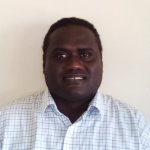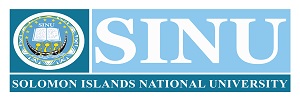Overview
The School of Sciences (SOS) is a new school in the Faculty of Science and Technology (FST) that established in Year 2020. The School is established to serve the training and education needs of Solomon Islands in the programme field of pure science and science related sectors. It offers quality Bachelor programmes in Biology, Chemistry, Physics, Mathematics and Computing Science. SOS will also offer programs in the other science related field of studies such as environmental science, marine science, advance statistics and information system. In the first semester of year 2020, the School teaches all science units and computing units for Bachelor of Teaching Secondary and Primary Education in the Faculty of Education and Humanities (FEH). The school also teaches mathematics and computing units for Bachelor of Accounting and Diploma of Finance and Business Administration in the Faculty of Business and Tourism (FBT).
The School of Sciences further assisted the University Preparatory College (UPC) with all Science units for University Preparatory Certificate level 3 and Certificate level 4, to provide deep knowledge foundation and broad academic skills to students in preparation for higher tertiary studies. The basic Certificate level 3 and level 4 studies are for students who passed Form 5 (Year 11) and Form 6 (Year 12) levels but have no placement in other tertiary schools. They can apply to School of Sciences to upgrade themselves in their science units under UPC preliminary programmes, before embarking on Bachelor of Science programs offered by the School.
The future aspirations and plans of the School is to develop a Postgraduate study programme, which teaches students essential research skills needed for Master and PhD theses and for more general work-related research activities. By establishing the multi-disciplinary postgraduate programme, the graduates will be able to assume creative leadership roles in shaping sustainable societies and support the growth and development of the school, teaching and learning of science in the Solomon Islands. The aim is to create an advance knowledge and application skills of science technology in order to develop the understanding of science in our everyday life.
The School of Sciences will further develop the Master and PhD programme that examines how societies and people interact with accelerating global changes in the world of science. And enables students to create new conceptual, theoretical, methodological, and translational innovations that integrate and move beyond discipline-specific approaches to address a common problem, engage in development issues and policy development in Solomon Islands.
The school currently offers Bachelor of Science programs in Biology, Chemistry, Physics, Mathematics and computing science.
The School of Science comprises of five departments at Panatina campus, east Honiara.
Departments
The School of Sciences hosts the following departments and programme of studies:
- Biology Department
- Bachelor of Science Biology Major Programmes
- Physics Department
- Bachelor of Science Physics Major Programmes
- Chemistry Department
- Bachelor of Science Chemistry Major Programmes
- Mathematics Department
- Bachelor of Science Mathematics Major Programmes
- Computing Science Department
- Bachelor of Science Computing Science Major Programmes
The School of Sciences is offering major BSc programmes in Biology, Chemistry, Physics, Mathematics, and Computing Science. In the initial stage of the Bachelor of Science program structure, the School of Sciences offers the double majors program. In the future, single major program will be offered and implemented when more new units are developed. Program structure below shows the double major programs that are currently offered in the School of Sciences. Student pursuing these programmes in the School of Sciences can select any of the double major programmes that currently offered:
- Chemistry and Biology Double Majors
- Mathematics and Physics Double Majors
- Mathematics and Computing Science Double Majors
- Physics and Computing Science Double Majors
- Biology and Computing Science Double Majors
- Chemistry and Computing Science Double Majors
- Chemistry and Physics Double Majors
- Biology and Physics Double Majors
Aims
The School of Sciences strives to develop an accredited and ranked science programmes that suit the needs of students locally, regionally and internationally with high-caliber graduates who are:
- Well equipped with the latest theoretical and practical skills in science and further provide a pathway for students to achieve higher Bachelor of Science qualification degree.
- Experienced in multinational team work environment of research and projects based learning.
- Capable of utilizing the latest science technologies efficiently to stimulate the national economy by meeting the demands of the current job market locally and abroad.
- Establish a well prepared and comfortable relationship with science industry and government through quality teaching, research and services.
Head of School

Dr. Timothy G. Kale (PhD Com. Eng., Assist. Prof. Com Eng)
Dr. Timothy Girry Kale graduated with a Masters Degree of Computer Engineering in 2012 at the University of Electro-Communications (UEC) in Tokyo, Japan. In 2015, he graduated with a PhD Degree at the same University and then employed as the Assistant Professor from 2015 to 2017 at the UEC Research Network Architecture Laboratory. His research specialize areas include Internet overlay network, wireless network, network security, network architectures and Internet protocols.
He joined the Solomon Islands National University (SINU) in 2019 and currently employed as the Assistant Professor of Computing Science in the Department of Computing Science, School of Sciences under Faculty of Science and Technology. Prior to taking up the position as the Head of School of Sciences, Dr. Kale served as the Acting Head of School from 2020 to 2021. He is also the current Head of Computing Science Department. Under his leadership he provided high-level educational leadership and developed new pure science programmes to ensure higher standards of educational programs meet the needs of the students at the local, regional and international levels and, to ensure the Solomon Islands National University strategic development plan and vision are successfully accomplished. Through his leadership, he also started the new School of Sciences under Faculty of Science and Technology and developed the Bachelor of Science Degree programme offered in 2022, which was also the first degree of pure science programme to be offered in the Solomon Islands. He is an experienced academic researcher with more than 15 years of Science research at the global International level and Asia pacific region.
Apart from his administrative duties, he also teaches Computing Science Degree courses and aim to provide the opportunity for students to further pursue and achieve higher academic dreams in Computing Science and Informational Technology Degree at SINU. One of his goals is to bring the school to the next level and produce the best science graduates from SINU who would be well equipped with the latest science theoretical and practical skills, and to provide a pathway to achieve higher experience in the multinational teamwork environment, research and project-based learning, and to have the capacity to stimulate the national economy by meeting the demands of the broader job or any market needs in the country and abroad.
Dr. Kale further focused on building connections with other Regional and International institutions to create relationship with the School of Sciences to benefit in areas of Science research and trainings for capacity building for the staff. He firmly believes in working collaboratively with other established institutions and to learn from them will enhance the Science programme offered in SINU, and provide the best accredited and ranked BSc science programmes in the Pacific region that would address the needs of local, regional and international students.
